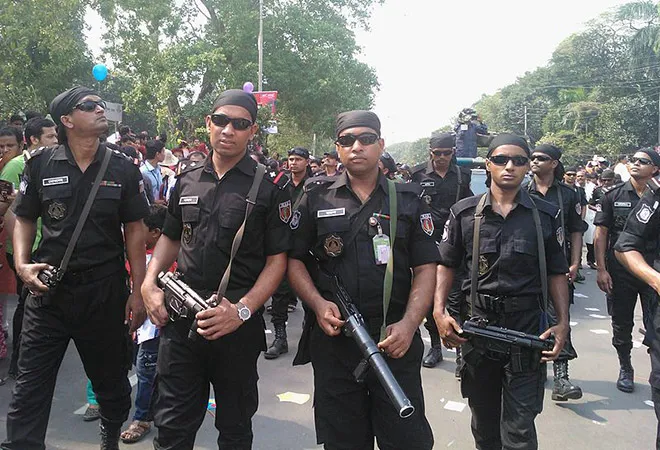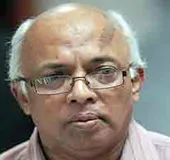-
CENTRES
Progammes & Centres
Location

Image Source: Wikimedia Commons/Nahid Sultan
File picture of Bangladesh's Rapid Action Battalion
In Bangladesh, these are testing times for the government led by Prime Minister Sheikh Hasina. In recent weeks, it has been an embattled administration she has presided over, with students in two phases emerging on the streets to demand that wrongs be set right. Obviously, the powers that be have been left rattled by these incidents, given that this also happens to be an election year. Voting for a new parliament must be held by the end of December or, at the very latest, by early January next year.
The crises which the government has been trying to weather, therefore, are in many ways a reflection of the government’s worries before it goes to the polls.
The difficulties the government has been confronted with in these past few weeks, as stated earlier, have come in two phases. In the first, the government was embarrassed by an explosion of student discontent brought about by the demand of the young that reforms be initiated in the quota system for employment in government services. One cannot quite deny that the students were justified in raising that demand, given that at present as much as 57 per cent of places in government services, based on annual examinations to the civil service, are given to various categories of candidates under the quota system. A whopping 30 per cent, which was initially reserved for freedom fighters, guerrillas who waged war for independence from Pakistan in 1971, was subsequently extended to include the children of the self-same freedom fighters.
That perhaps was not a problem since Bangladeshis have consistently held freedom fighters and their immediate families in deep esteem. The problem arose, however, when the government made it known that the 30 per cent stipulation would also be enjoyed by the grandchildren of the freedom fighters. Besides, quotas for such categories as the indigenous sections of the population and women have prevented truly meritorious students from finding places in government despite their good performance at the civil service examinations. For these students, indeed for a very large section of the population, the quota system forty seven years into independence has therefore been looked upon as a proposition which has gone past its sell-by date.
Public support was evident for the agitation initiated by the students, who were largely from the nation’s universities.
The agitation at one point prompted Prime Minister Sheikh Hasina into declaring an end, in parliament, to the quota system. But her statement appeared to have been made more in indignation than in any serious consideration of the problem. Despite that, her statement was welcomed by the students, who expected the government to move quickly into bringing in the needed reforms. Government officials too went out on a limb to reassure the country that the reforms called for would be carried through. Until the judiciary intervened, at which point the Prime Minister told parliament that her promise could not be kept because the matter was now in the hands of the court.
Perhaps circumstances would have been easier had violence had not come into it. Activists of the Chhatra League, the student wing of the ruling party, went into action against the quota reformists at various spots in the nation’s capital and elsewhere, and at some stages even manhandled senior teachers of universities who tried to stop them from assaulting the students. Clearly, the violence, with the government maintaining a mysterious silence, left a bad taste in the mouth.
No sooner had the quota movement come to an end, or been suppressed, than a new agitation sprouted in Dhaka. The spark for the new agitation was provided by Dhaka’s notorious road traffic system.
Two young students, caught in a race between two speeding buses, were crushed under the wheels of one, with several others being injured. Matters were not helped when Shahjahan Khan, a minister in Sheikh Hasina’s cabinet, attempted to dismiss the tragedy as being of little consequence by drawing a bad analogy with the death of 33 people in a road tragedy in India’s Maharashtra state. His smirk on television infuriated citizens, the school- and college-going students in particular, for the good reason that apart from holding the portfolio of shipping in the cabinet he is also the president of Bangladesh’s bus owners’ federation and has mischievously defended rash driving on the nation’s highways in recent years.
Demands immediately erupted for the minister’s resignation. The students swiftly took to the streets and for a whole week managed traffic movement in the city, streamlining the entire system into the kind of discipline which citizens had always demanded but had never been provided with. The students came up with a nine-point demand which the government accepted with alacrity. But one of the major grievances of the young, that the shipping minister be sacked or resign, did not materialize. In the end, with the students refusing to leave the streets and with dark rumours of so-called atrocities perpetrated by government supporters flooding social media, the police went into action. It was pitiless action on the part of the police, assisted as it was by young armed supporters of the ruling Awami League. But it did subdue the students.
These incidents have predictably raised a number of questions about the performance of the Awami League at the forthcoming general elections. It has been in office since January 2009 and would clearly like a fresh and third consecutive term in power. That depends on how much of damage control it can go into before its candidates take to the hustings.
The views expressed above belong to the author(s). ORF research and analyses now available on Telegram! Click here to access our curated content — blogs, longforms and interviews.

Syed Badrul Ahsan is a Senior Journalist and Commentator on South Asian affairs based in Dhaka. Ahsans entry into full time journalism came about through ...
Read More +